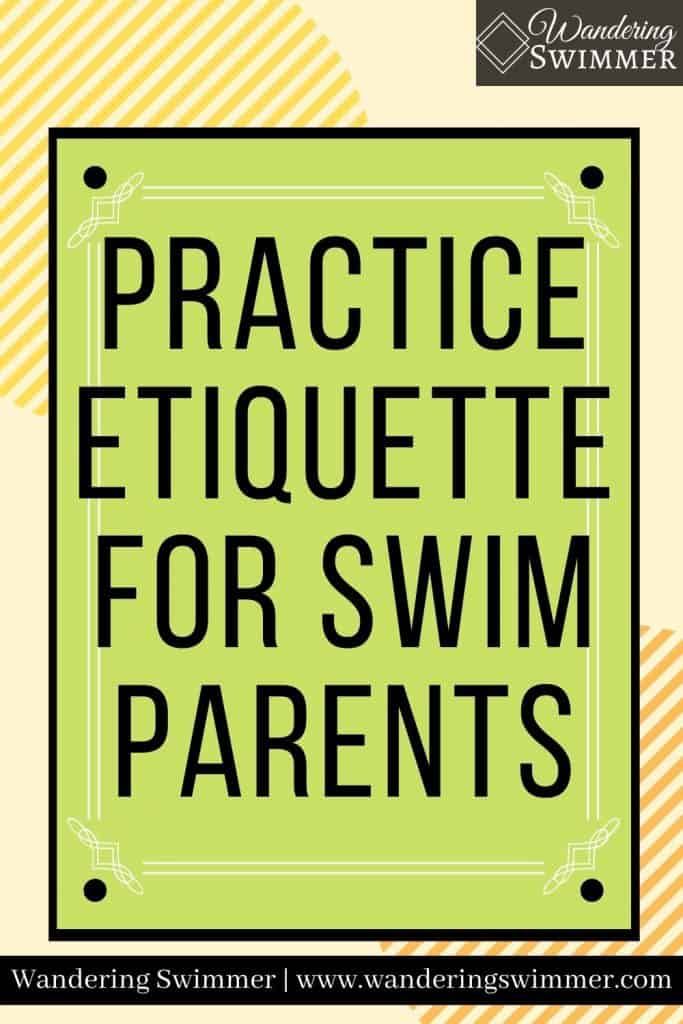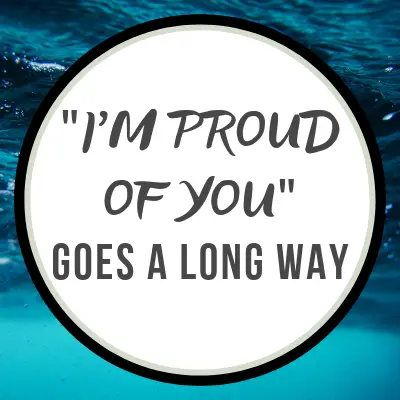As a swim parent, it’s tempting to want to encourage your child during practice. Or maybe give them your own coaching advice. To which all swimmers and coaches will tell you: “Don’t do it!”
Because despite what you may think, swim etiquette isn’t just for swimmers. It’s also for swim parents!
But what are those unknown rules and guidelines for practice etiquette for swim parents? Here are eight tips to keep you from committing a faux pas at your child’s swim practice.
Disclosure: This post may contain affiliate links, meaning we earn a small commission at no cost to you if you purchase something through one of our links. As an Amazon Associate, we earn from qualifying purchases. Please check out our disclosure page for more information.

Don’t Talk to Your Child During Practice
Trying to talk to your child during practice while they’re training is rude. It’s exactly the same as butting into someone else’s conversation. Only in this case, you’re interrupting a conversation between your child and the coach.
And it isn’t just rude to the coach. It’s also discourteous and distracting the team as a whole.
Whether you’re sitting on the pool deck itself or up in the stands. Keep your comments and questions to yourself. No one appreciates you shouting or calling out to your child for whatever reason.
The time that your child is on deck or in the water is not your time. It’s the coach’s time and it’s your swimmer’s time.
If there is an emergency and you need to leave, then get the coach’s attention first. They’ll pass along the message to your child or have them talk directly to you.
Don’t Try to be the Coach
Remember, you’re not the coach! You’re the parent first and foremost.
It’s not your job to critique your swimmer’s stroke and try to have them change it in practice. Doing so is an insult to their coach. Plus, it’s embarrassing to your child.
And yes, part of parenting is sometimes embarrassing your child. 😉 But at practice (or a meet!) isn’t the place for that.
Much like trying to talk to your child during practice, trying to coach them causes a distraction. It’s also a great way to make your child resent swimming. As they’ll always feel as though they’re under your spotlight.
Let the coach do their job and take a moment to enjoy an hour or more of relaxed responsibility!
Ask Questions After Practice
Or better yet, send them an email. Or give them a call.
Can you ask a question or make a comment? Yes! There’s nothing wrong with asking questions. However, you should limit these types of questions until after practice. It’s just good practice etiquette for swim parents.
Doing this ensures that the coach has time to talk. Provided they don’t have another group coming in. We would also caution against asking just before practice starts. Some coaches start preparing the swimmers for practice and don’t always have time.
If you find that you can’t reach the coach directly after practice, send them an email. Or give them a call if you can.
It might seem tedious, but it’s the most professional way to handle this. Coaching is a job. And, much like any other job, sometimes you need to schedule a meeting to get your questions answered 🙂
Don’t Record Other Swimmers
It may sound strange, but it does happen!
Some parents try to record other swimmers in hopes that their child can learn a skill by watching a teammate. Such as executing a faster flip turn. Or perfecting a stroke.
Which, in theory, sounds like a good idea.
But in reality, it could open you up for a slew of legal issues if someone finds out. Because in some cases, you’re recording someone who is underage. And some parents will take offense to that.
It’s better to err on the side of caution and just not do it.
If You Don’t Have to Stay, Don’t!
This isn’t just practice etiquette for swim parents. It’s also some helpful advice, too! Because you have a busy life. Places to go, things to do, and work to catch up on.
We get it. Everyone’s time is precious and we can all do with the gift of time.
Because of this, if you don’t have to stay at your child’s practice, then don’t stay! Especially if your swimmer is older and has a longer practice.
Related article: 8 Things to do During Your Child’s Swim Practice
And we’ll let you in on a little swimming secret. Both the coaches and the swimmers would prefer if you didn’t stay at practice.
It gives swimmers a break from being around their parents and helps them focus solely on swimming. Having you sit around and watch them puts an unneeded burden on them. Because not only do they have to meet the coach’s expectations. But now, they have to meet yours, too.
Instead, take the gift of time and do something for yourself!
Catch up on a show or some work. Go exercise or even go back home to relax! You have the time, use it! 🙂
Be Encouraging to Your Swimmer
Practices are long and hard.
Having a parent who only wants to focus on the negative things after practice makes the workout that much worse.
Yes, you might feel frustrated that your swimmer didn’t make all their sets. But you know what? They’re probably feeling just as frustrated at themselves. When you add onto that, it only compounds the problem.
Instead, be encouraging. Let them know that setbacks happen but that they always have tomorrow. Tell them to keep trying because you know they can do it.
A little bit of positive energy goes a long way!
And if they had a great practice? Fantastic! Be sure to build those up, too. Because everyone has good and bad practices.
More often than not, swimmers remember the bad practices more than the good ones. Much like you remember the horrible days at work over the good ones 🙂
Lastly, if they don’t want to talk about practice, then don’t talk about practice. Sometimes, the best thing a parent can do for their swimmer is to let them disconnect from the sport.
Related articles:

Be Civil to Other Swim Parents
You don’t have to like every swim parent on the team. Trust me, we all have those individuals that we aren’t fond of.
However, that doesn’t mean that you should abandon common courtesy.
Now, we’re not saying you have to be best friends. Or that you have to get along. But a small ‘hello’ or ‘have a good day’ goes a long way. Even if they never say anything back, you acted as the better person by at least trying.
But gossiping, making crude comments or expressions, and being rude is a direct reflection on you. Which also reflects on your swimmer.
So while you might want to say something negative about another parent, hold back. You don’t always know the full picture. Or what’s going on in their life. Instead, take a breath and hold your tongue.
In doing so, you’re bettering yourself. And you’re setting a great example for your swimmer and other parents! 🙂
And Other Swimmers
Yes, they might be a ‘rival’ swimmer to your child, but they’re still kids.
Younger kids don’t understand why you might act so ‘mean’ to them. And for teenagers, you’re merely setting a bad example.
And, we’ll be brutally honest here. You’re telling others how immature and petty you are.
Instead, suck up your pride and act like an adult. You don’t have to love that rival swimmer the same way you love your child. But you should still treat them with respect.
If they’re faster at practice than your swimmer, they’re probably doing something right! You shouldn’t dislike someone just because they’re better than your child.
Is it tempting? Yes!
But, model good sportsmanship for your child. We promise they’ll come out ten times better for it.
As always, to happy swimming!
–Chevron
Bonus Content:
What to Know Before Your Child Joins a Swim Team: When your child joins a swim team, they rely on you to help them succeed. And not considering these 4 things can cause surprises along the way.
9 Words Swim Parents Should Know: New to being a swim parent? To help better understand your swimmer, here are 9 easy words that swim parents should know.

Want to Improve at the Pool?
Join swimmers and swim parents to receive my free newsletter and receive a free Swimming Glossary e-book as a thanks!
Every month you’ll receive tips and coaching to help you find success at the pool.
About
Chevron is a current competitive swimmer with almost 20 years of experience in the pool. And although she fell into the sport by accident in her high school years, she still trains daily and competes throughout the year. She’s committed to providing guidance to all levels of swimmers and believes that everyone should know how to swim.
